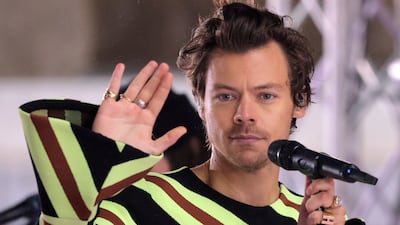Lady Gaga, David Beckham, Game of Thrones and even Lost have been the subject of entire university courses in the past, and the latest pop culture idol to get the academic treatment is Harry Styles.
The former One Direction star, 28, is the focus of Texas State University Honors College's spring 2023 course titled Harry Styles and the cult of celebrity: identity, the internet, and European pop culture.
It will focus on understanding the "cultural and political development of the modern celebrity", according to an advertisement for the course, "as related to questions of gender and sexuality, race, class, nation and globalism, media, fashion, fan culture, internet culture and consumerism".
Bringing perceived "lowbrow" topics into higher education is nothing new and the courses, like their subjects, shift with the times.
Here are a few other quirky pop culture-inspired courses worth considering.
Vampires, Monstrosity, and Evil: From Slavic Myth to 'Twilight'

Popular Culture Studies at The Ohio State University includes all sorts of unique and interesting modules as part of the course, such as the art and politics of hip-hop and contemporary pop culture in Greater China.
There's also Vampires, Monstrosity, and Evil: From Slavic Myth to 'Twilight', which explores "changing approaches to evil as embodied in vampires in East European folk belief", as well as European and American pop culture. There's a focus on the "function" of vampire and monster tales in a cultural context.
Star Trek: Inspiring Culture and Technology

A five-month XSeries programme by the Smithsonian Institution explores the influence of Star Trek on culture and technology. Students learn why the popular science-fiction show is such a good basis for academic learning, in particular media scholars, to "analyse the history of television, the impact of science fiction on technology and the phenomenon of fandom".
The course explores how the TV series served as the inspiration to governments and individuals for the space race, and how it rewrote the script on diversity, and how people consider different races and genders.
How to Do Things with Memes

This mini three-day EdX course from an associate professor at Davidson College explores the wild and wacky world of memes. Learn how and why they infiltrate the internet like wildfire, and what it means to express feelings, attitudes and politics via this "new folk art form". The course also explores the history of GIFs, surveys, the use and abuse of memes, and has you making your own.
Zombie Apocalypse

Zombies are the basis of many a college course these days. One of the most famous is Michigan State University's Surviving the Coming Zombie Apocalypse: Disasters, Catastrophes and Human Behaviour, which has a whole website dedicated to it, complete with an eerie, gory trailer.
The site describes the course as an award-winning Multimedia Online Learning Immersive Experience, or Molie, that explores human psychology and behaviour during disasters and catastrophes.
Science from Superheroes to Global Warming

The University of California, Irvine has a physics course that takes inspiration from superheroes. "Have you ever wondered if Superman could really fly? What was Spiderman's spidey sense? How did Wonder Woman's invisible jet work?" the course description reads.
The ultimate aim of the course is to teach students an appreciation of the scientific method and how to spot "good" science via case studies, including superheroes, movies and real-world issues such as global warming.


